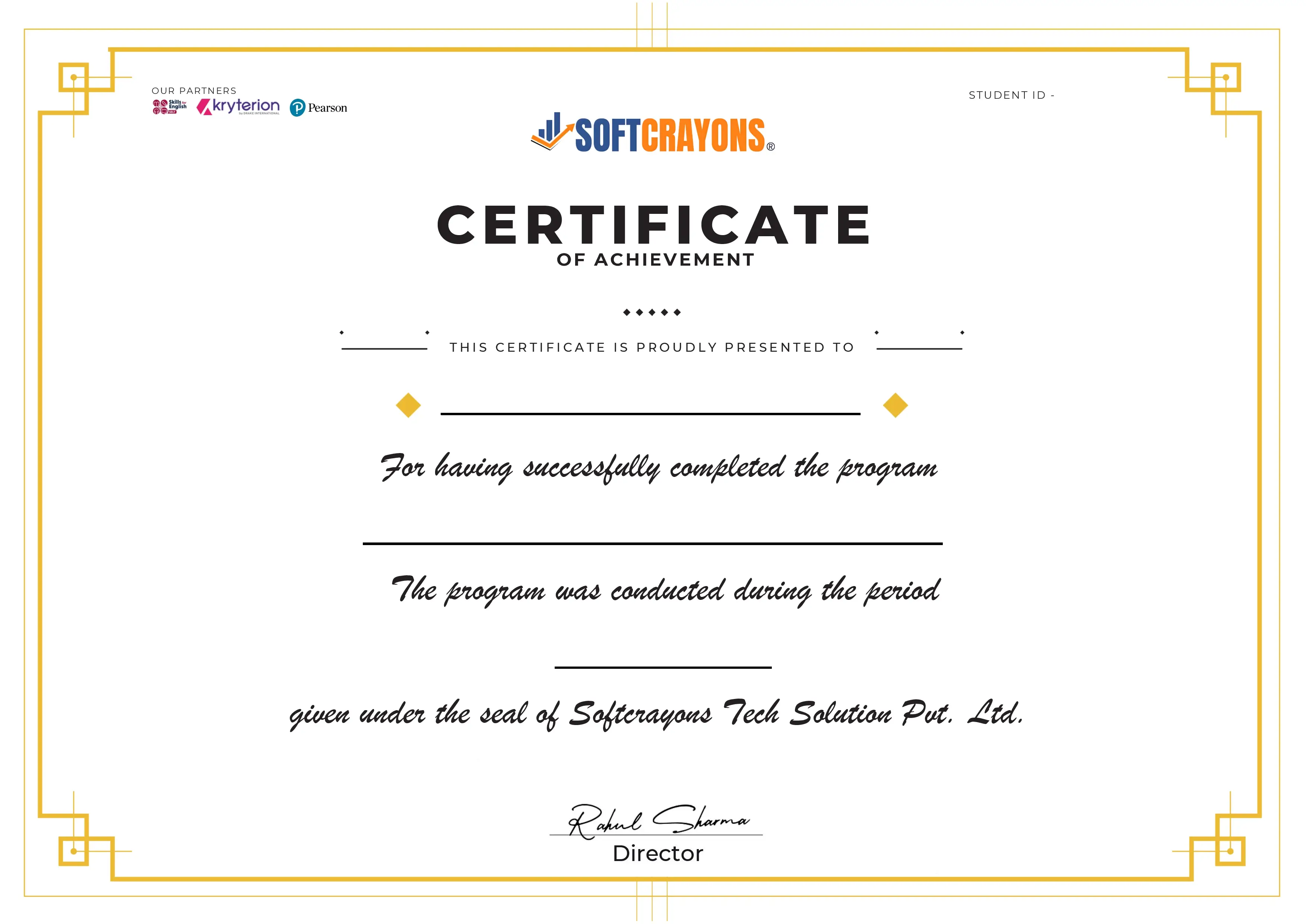Deep Learning Training Noida
"Innovate. Integrate. Inspire The Future with SoftCrayons"
In artificial intelligence, "deep learning" refers to applying sophisticated scientific ideas and methods (AI). In tandem with the exponential growth of data stored and sent digitally, the Deep Learning Certification Course is constantly developing new techniques to process this data.
To advance your career in the Artificial Intelligence Certification Curriculum, consider becoming an expert in deep understanding. This article defines deep learning AI and provides case studies of its application to enhancing workflows and identifying root causes of problems.
Learn, Build Skills, Grow Limitlessly. Your IT Career Starts Here.

Course Duration
2 - 3 Months

New Batch
As per schedule hybrid mode

Payment
Flexible One-Time/Installment

Mode
Flexible Offline/Online
Professional Skill Development
Service Details
Best Deep Learning Certification Training in Noida By Softcrayons
In artificial intelligence, "deep learning" refers to applying sophisticated scientific ideas and methods (AI). In tandem with the exponential growth of data stored and sent digitally, the Deep Learning Certification Course is constantly developing new techniques to process this data.
To advance your career in the Artificial Intelligence Certification Curriculum, consider becoming an expert in deep understanding. This article defines deep learning AI and provides case studies of its application to enhancing workflows and identifying root causes of problems.
What Is a Deep Learning Certification Course in Artificial Intelligence Curriculum?
Those who can explain what deep learning AI is will have an advantage. What is meant by the term "deep learning" in the context of machine learning is a multi-stage, algorithmic process.
Deep Learning Certification Training understanding is modelled after the neural networks in the human brain. The data that an AI system can process is greatly improved with the help of deep learning architecture. Deep describes the number of intermediate transformation stages that occur during the procedure.
Overview Of Define Deep Learning Course Training Methods.
Deep learning Certification Course produces practical solutions for end users by sifting through massive data. The most widely used deep learning techniques for developing procedures and solving various problems are summarised in the following list.
-
Neural Networks With Multiple Layers of Processing Power (or "Multi-Layer Perceptrons (MLP)
-
Long-Short-Term Memory Recurrent Neural Networks (LSTM-RNNs) and Convolutional Neural Networks (CNNs) (LSTM-RNN)
These cutting-edge neural networks can be used by businesses to plan for the future, make better judgments regarding existing products, services, and tasks, and achieve their long-term objectives. For a thorough breakdown of how these networks function, please refer to the following:
-
MLP, or Multi-Layer Perceptron (MLP)
In deep learning, a Multi-Layer Perceptron is a popular artificial neural network. Over time, numerous high-quality neural network models based on MLP have been made available to the public in Deep Learning Training Certification. Some multiple neural nodes or units communicate with and learn from one another.
The input, output, and hidden layers comprise the MLP's three layers. The layer in a multi-layer neural network (MLP) that takes in data is called the input layer. One hidden layer in every MLP is responsible for all the sophisticated calculations and mathematical operations on the input data. Neurons in the output layer show meaningful output.
A multi-layer perceptron (MLP) is a type of feedforward neural network because information flows from the input layer to the output layer. Each connection between the three layers is weighed to show its significance.
If you want to know how much a plane ticket will cost, the trip date will be more important than the place you're going to. Typical uses of MLA include stock analysis, election analysis, spam detection, and image identification.
-
Deep Convolutional Neural Networks (CNN)
These deep neural networks mimic the neuronal organization seen in the brain's visual cortex and are trained to perform the task of picture classification. In the context of sequence prediction issues, these networks are taught to rely on precedence relationships with the Deep Learning Certification Course.
Long short-term memories (LSTMs) are a sophisticated network widely used in speech recognition and machine translation. Like computer memory chips, long short-term memory (LSTM) units work together to address various problems by building upon previous results.
Why Does Deep Learning Certification Course Succeed When Others Have Failed?
Best Deep Learning Course Certification systems use supervised and unsupervised techniques when training outputs are based on inputs. Using inputs, weights, and biases, deep learning networks are created.
Together, they help us identify, categorize, and characterize data objects. The main phases of deep learning consist of the following:
-
The artificial neural network poses a series of yes/no questions.
-
When fed data sets, a neural network can reliably and accurately extract numerical values.
-
The gathered information is then sorted into various categories.
-
The information must be classified, marked, and labelled as the last stage.
Where Is Deep Learning Course Certification Most Commonly Used?
Knowing what kinds of technological applications use deep learning is crucial to grasp what it is and how it works. Major internet corporations, for instance, have artificial intelligence research divisions where they work on projects like automatic tagging systems for images of people and objects.
While many see positive outcomes from these applications, others have voiced worries about how the widespread adoption of the Deep Learning Certification Course would affect personal safety and confidentiality. Here are some other applications of deep understanding:
-
Perceptions of the Customer
-
Recognizing spoken words mechanically
-
Self-driving cars
-
Correction of grayscale images
-
Machine-vision systems
-
Colourization of Video
-
Assistance to Clients
-
Robots with deep learning capabilities
-
Toxicology and drug development
-
Farming
-
Banking and other financial services
-
Healthcare
-
Creating Captions for Images
-
Recognizing images
-
Recognizing Language
-
Justice system
-
Promoting products and services via mobile devices
-
Mechanisms for recommending content and services
-
Input text generation
-
Machines that translate
In What Ways Do Machine Learning & Deep Learning Certification Training Vary from One Another?
Like machine learning, Deep Learning Course Certification can be considered a subset of AI. Data sets and algorithms are used in these fields to provide extremely fine-grained output and answers. There are numerous subtle and apparent distinctions between them. There are rare essential differences between the two:
-
Hardware
When compared to deep learning, machine learning is more straightforward. Traditional computers with central processing units (CPUs) can execute algorithms. Hardware upgrades are necessary for deep understanding.
Since GPUs' memory capacity is more significant in the Deep Learning Certification Course, they are becoming increasingly important. Delays in transferring information between brain cells are minimized. Parallel processing of many complex calculations is facilitated by GPUs as well.
Human involvement may be needed in machine learning situations where the expected result does not match the desired solution. Information is passed across successive layers of the artificial neural network as the deep learning system acquires knowledge.
These systems can auto-diagnose errors and fix them without help from a human operator. Only with subpar input or data sets does the possibility of error in deep learning exist.
Specific amounts of time are required for its implementation.
Training a machine learning algorithm takes a few seconds to a few hours, and one can implement it much more quickly. Due to their complexity and extended training times, deep learning algorithms are only used in limited situations. The training process for ResNet, one of the state-of-the-art algorithms, takes around two weeks.
-
Data
Because it is based on human-created rules, traditional machine learning can get satisfactory results in Deep Learning Certification With Training, even with less data. However, deep understanding requires a lot of data to make discoveries, and it may not do so well with limited datasets.
-
Approach
Conventional software often employs a sequential method of analysis. Machine learning relies on structured data and employs traditional methods like linear regression. Nonlinear methods are used in the hierarchical function of deep learning systems, and neural networks can handle unstructured input.
-
Features
Machine learning Course Certification is identified by specialists, who then manually code them according to data type and domain. Machine learning operates at its peak when developers correctly detect and extract features like pixel values, shape, textures, and location.
Deep understanding is advanced because it attempts to learn abstract properties from data. As a result, fewer new feature extractors will have to be created.
For instance, related to Deep Learning Certification Training, a Convolutional Neural Network will first attempt to learn low-level features like edges and lines before moving on to sections of the face and, finally, a high-level representation of a look.
-
Method For Addressing Issues
With machine learning, the algorithm first decomposes the problem into smaller, more manageable chunks and then aggregates the results of each solution to arrive at a final answer.
When solving an issue, a Deep Learning Course Training looks at it from every angle. It simultaneously executes several procedures and provides a comprehensive solution.
-
Uses and Applications
Machine learning works best with applications that have a small amount of well-structured data to work with. Predictions of the stock market or the weather, for instance.
Machine Learning Training Certification is also used in more straightforward applications, such as spam filters in email and social media recommendations. Machine learning is helpful in domains such as image processing, image classification, picture and audio recognition, statistical arbitrage, and extraction.
Ordinary profound in Deep Learning Certification Course sessions include virtual assistants, computer vision for autonomous vehicles, customer service chatbots, facial recognition apps, translation apps, and e-commerce platforms.
What Are Some Of Deep Learning Certification Course Advantages?
If your data is unstructured or unlabeled, deep learning may help. Developers use the wide availability of deep learning libraries, algorithms, and open-source frameworks to create a wide range of valuable products. It's quick, scales well, and can use many graphics processing units to calculate simultaneously.
Automatic feature detection is made more accessible by deep learning, which does not necessitate feature extraction in advance. It's a reliable system, and one may modify a single neural network-based strategy for use with different kinds of data and in various contexts.
The potential for Deep Learning Training Courses to be combined with other technologies, such as big data, the brain-computer interface, the Internet of Things (IoT), and drones, has increased.
Where Does the Deep Learning Certification Course Fall Short?
When dealing with deep learning, only massive volumes of data will do. It can be costly to train it with vast and sophisticated data models.
Performing sophisticated mathematical computations also requires a large amount of hardware. In the realm of deep learning, no established method exists for choosing the appropriate equipment.
However, deep learning algorithms often fail to yield beneficial results when applied to challenges that span multiple disciplines.
Joining Deep Learning Certification Training may not ensure a one-hundred-per-cent accurate outcome. Erroneous results may result from inaccurate, incorrect, or flawed input data.
Although deep learning with AI Training Certification understanding has the potential to answer a wide variety of issues, its algorithms tend to excel at classification problems, and problems not given in a classification format may remain unsolved.
Join Softcrayons now for more updates.
Training Features
Live Interactive Classes
Real-time doubt clearing with expert instructors
Hands-on Projects
Build portfolio with industry-standard projects
Industry Curriculum
Updated syllabus matching current job requirements
Latest Technologies
Learn cutting-edge tools and frameworks
Online & Offline
Flexible learning modes to suit your schedule
Certification Support
Prepare for global IT certifications
LEARNING PATH
Master the Syllabus
Program Highlights

Top Faculty with Certification Facility
Learn from the best, as we impart world-class education with faculty who have rich academic & industry experience

Career Service: Job Readiness
Pursuing your desire to being job-ready through resume building sessions & MasterClass for interview preparation

Choose the way you want to learn
Enhance your learning potential by your choice of printed books, audio books, e-books, videos, and live classrooms

Placement Guarantee
Benefit from our network of over 500+ hiring partners from diverse domains to ensure a smooth job transition after 1 year
Common Questions
Upon successful completion of the program, your certificate will be emailed to you in a digital format. You can also download it from your Softcrayons account.
This advanced certificate course in cloud computing provides you with in-depth knowledge and hands-on experience in cloud technologies, preparing you for high-demand roles in the industry.
If you miss a lecture, you can access the recorded session on the Softcrayons platform. Additionally, you can reach out to our support team for further assistance.
This training prepares you for various cloud certification exams, such as AWS Certified Solutions Architect, Microsoft Azure Fundamentals, and Google Cloud Professional certifications.
We offer a 7-day money-back guarantee. If you're not satisfied with the program, you can request a refund within 7 days of enrollment, subject to our terms and conditions.
Yes, Softcrayons offers a batch deferral policy. You can defer your batch to a later date if you're unable to attend the current session, subject to availability.
Join Our Deep Learning Training Noida
Guranteed Job Placement Program
- Expert-led training
- Hands-on projects
- Globally recognized certification
Training Certification
🎓 Earn Your Certificate
Successfully complete the training and assessments to receive your official certification. This credential validates your skills and enhances your career opportunities.
Showcase your achievements and share your milestones with your network to inspire others and grow your professional connections.

Interested in this Program? Secure your spot now!
Upcoming Batches
Program Induction
Program Induction
Interested in this Program? Secure your spot now!
What People Say About Us
Himanshu Tyagi
I have completed the course in 3-4 months of DIGITAL MARKETING training under the guidance of Experts Trainers. It was the best experience to learn under them and their teaching methods are out of the box. Best institute for professional courses and a great place. and very cooperative company with helpful staff.
Related Courses


